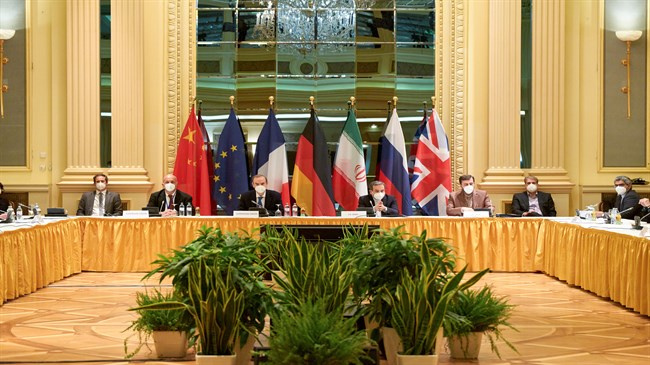Russia: Vienna talks aim to restore original JCPOA

Russia’s lead negotiator at the Vienna talks on the revival of the 2015 nuclear deal with Iran said the negotiations aim to restore the agreement in its original form, "nothing more and nothing less".
Mikhail Ulyanov, Russia’s permanent representative to international organizations in Vienna, made the remarks in a tweet on Friday, asserting earlier statement by his Iranian counterpart Kazem Gharibabadi, who said Tehran would not allow the Vienna talks to feature irrelevant issues, Press TV wrote.
In an interview published on Wednesday, the Iranian permanent ambassador to Vienna-based international organizations said the European parties to the deal, officially known as the Joint Comprehensive Plan of Action (JCPOA), “still consider the nuclear agreement to be a bridge enabling their interference in irrelevant issues such as Iran’s missile work and its regional affairs”.
“The purpose they seek through this is to start addressing these [irrelevant] issues [on various occasions] and consider them to be indivisible parts of the nuclear deal, and [therefore] lay the groundwork for their interference in these areas,” Gharibabadi said.
He reflected on a warning issued by Leader of the Islamic Revolution Ayatollah Seyyed Ali Khamenei on Wednesday about the West’s intention to use the JCPOA to enable interference in the Iranian affairs.
The Leader cited Iran’s experience of dealing with the West on the issue of the nuclear agreement as an important case in point that had clearly shown “trust in the West does not work and will not work [in the future either]”.
In his tweet, Ulyanov urged all the parties to the JCPOA not to deviate from the main objective of the Vienna talks and to stop efforts to add something new to the deal.
“Indeed, the agreed goal of the Vienna Talks is to restore the original JCPOA. Nothing more and nothing less. All participants should take care of not creating – even non-intentionally – impression that they deviate from this common goal and try to add something new to the deal,” the Russian diplomat tweeted.
Iran has held several rounds of talks since April in the Austrian capital with Germany, France, Britain, China and Russia to restore the troubled agreement.
A sixth round of talks concluded on June 20 and dates for the next round have not been fixed.
Iran's top negotiator Seyyed Abbas Araqchi said in mid-July that the next round must wait until the new Iranian government takes office in August.
Seyyed Ebrahim Raeisiwon Iran’s presidential election in June and will on August 5 replace President Hassan Rouhani.
Last month, Iran stressed that the policies it has been pursuing on the JCPOA are among the “fundamental positions” of the Islamic Republic and thus will not undergo any change when the new government takes over.
The JCPOA offered Iran relief from US and other sanctions in exchange for limiting its nuclear program, but was torpedoed in 2018 when former US president Donald Trump withdrew from it and reimposed sanctions.
A year after the pullout, Iran began to drop its commitments to the deal in retaliation for the US unilateral actions and the failure to the European parties to the JCPOA to live up to their obligations.
Iran said its "remedial measures" are part of its rights enshrined in two articles of the accord.
Trump's successor Joe Biden has signaled his readiness to return to the deal and has engaged in indirect negotiations.
Germany blame game
German Foreign Minister Heiko Maas on Friday disregarded the European trio's noncompliance with the JCPOA and blamed Iran for delaying the resumption of the Vienna talks.
Maas said that the negotiation “is moving further and further away from the core elements of the agreement" and added the option to salvage the accord “will not be open to us forever".
He called for the resumption of the Vienna, saying a return to the multilateral agreement is “in everyone's interest”.
"We want a return to the JCPOA and are firmly convinced that this is in everyone's interest," Maas was quoted as saying by German weekly magazine Der Spiegel.
Disagreements have persisted over a number of issues in the course of the talks, including how to sequence the US sanctions removal, with Tehran arguing that since Washington was the party that violated the terms of the agreement, it should take the first step back into compliance with the deal by removing its unilateral sanctions.
Iran has also asked for guarantees that the US won’t again leave the JCPOA under a new administration but the Biden administration says it cannot give such guarantees.
Source: Iran Daily

